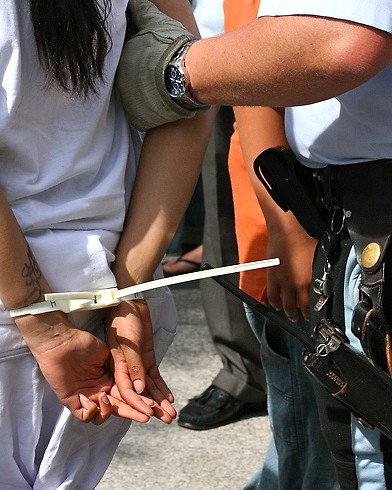There are many misconceptions about undocumented immigrants, says Cyndi Hicks, a Grand Rapidian who participates in the West Michigan Coalition for Immigration Reform.
"First of all, people aren't illegal. They can't be," she says.
"They are undocumented. And while yes, undocumented immigration is an illegal act, it doesn't make the person illegal," Hicks clarifies.
Hicks says she has also noticed a disconnect between middle-upper class Caucasian citizens understanding the root causes behind immigration and the issues immigrants face to become citizens.
"From my experience, people [Caucasians] who live in affluent neighborhoods tend to look at their immigrated neighbors of equal affluence to themselves and assume that they must have done immigration the 'proper way', while the rest [undocumented immigrants] are just lazy or criminal," she says.
"What they don't understand is that there is no 'proper way' to do immigration if you don't qualify for the paperwork," says Hicks. Qualifying for legal status requires specific economic and education standings that just aren't possible for the majority of immigrants, Hicks informs.
Some of the root causes of undocumented immigration to the United States include poverty, hunger, inequality and a lack economic opportunity. Much of this, says Hicks, is due to economic policies enforced by NAFTA and CAFTA and the subsidizing of crops in the U.S. such as corn. Now farmers in countries like Mexico are unable to sell their crops in their own regions because it has become cheaper to import corn from the U.S., forcing them to leave their homes.
"The current system relegates unauthorized immigrants to the bottom of the U.S. socioeconomic system – permanently," says Andrew Wainer, Immigration Policy Analyst for Bread For The World. Undocumented immigrants are unable to apply for citizenship because exposing their identities results in deportation. Without documentation they have no rights or citizenship protection, thus they are forced to live undercover with the constant fear of being deported.
"U.S. immigration policy does not enable immigrants to break the cycle of poverty by allowing them opportunities to improve their lives and those of their families by advancing professionally, pursuing further education, and fully integrating into their communities," Wainer says.
As of June 2012, the Obama administration passed an initiative called Deferred Action for Childhood Arrival (DACA). Hicks says that this is a small step in the right direction, but not a solution. She explains that DACA protects young people- who have, in most cases, lived in the U.S. their whole lives, graduated from high school, and are active members in their communities- from being deported, but it doesn't protect their citizenship.
"They are being treated like a second class of people just left waiting in line," Hicks says, "but the reality is that there isn't even a line to stand in because there isn't any way for them to advance."
Young people that qualify for DACA receive deferred action for a two year period. The DACA includes an application for a temporary Employment Authorization Document (EAD) that clearly identifies them as not being a citizen, which can be cause for prejudice in the hiring system of workplaces. Requesting DACA approval also costs $485 - a fee that is hard to cover when work is almost impossible to find without an EAD.
This information only sheds light on some of the details barring undocumented immigrants from becoming citizens, says Hicks. She says it is also important to understand what is happening to the the immigrants in the meantime, and that it is happening right here in Grand Rapids.
"Families are left completely devastated by being torn apart," says Hicks. She explains that often times children are present when their parents are arrested by the Immigration and Customs Enforcement (ICE) and then left alone.
"The ICE can stop anyone they want to ask for documentation. It happens anywhere: in homes, Amtrak stations and Greyhound busses… and if they don't have the right papers they take them right there leaving the kids," says Hicks.
"These ICE raids create emotional scarring on the children that lasts years and years," she says.
"I've personally witnessed this when five kids were left alone in a second floor apartment - one kid had cerebral palsy, and one was just a baby. This stuff isn't made up," Hicks says.
Another major issue that arises is when multiple families end up living together, says Hicks.
"It compromises children's safety, privacy and well-being on many levels," she says.
The West Michigan Coalition for Immigration Reform is currently in the process of forming a rapid response team that will function as a hotline with immediate aid support. They hope to have this functioning soon so that families have a number to call for help during the aftermath of an ICE raid. Other organizations such as GRIID and Michigan Organizing Project, as well as multiple individuals from the Grand Rapidian community, are also doing great work to fight for comprehensive immigration reform, says Hicks.
"There are people involved from all different sectors of the community, but we need more bringing awareness to the community at large," she says, "This includes faith-based communities, lawyers, educators, social services and nonprofits."
The Rapidian, a program of the 501(c)3 nonprofit Community Media Center, relies on the community’s support to help cover the cost of training reporters and publishing content.
We need your help.
If each of our readers and content creators who values this community platform help support its creation and maintenance, The Rapidian can continue to educate and facilitate a conversation around issues for years to come.
Please support The Rapidian and make a contribution today.


Comments
Great article Jennifer, this is really good work you are doing here.